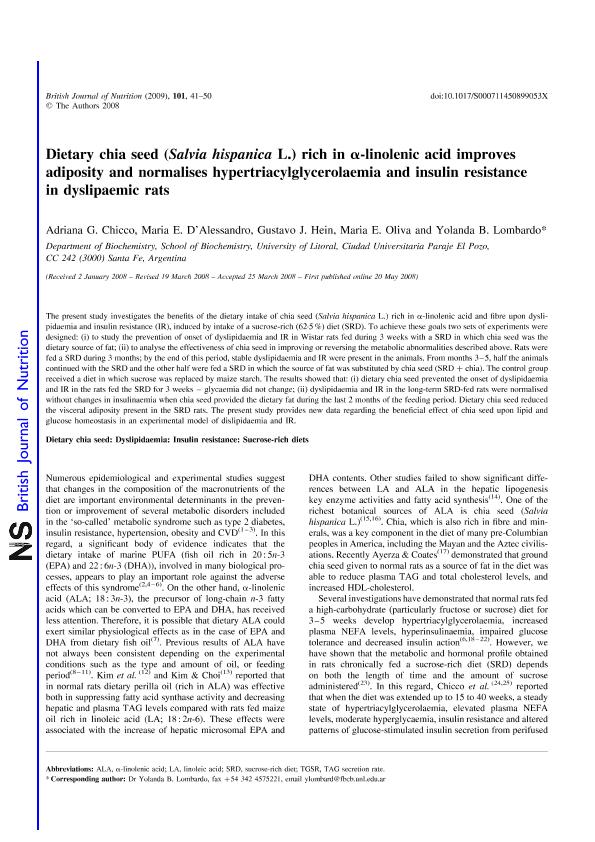Artículo
Dietary chia seed (Salvia hispanica L.) rich in a-linolenic acid improves adiposity and normalises hypertriacylglycerolaemia and insulin resistance in dyslipaemic rats
Chicco, Adriana Graciela ; D'alessandro, Maria Eugenia Guadalupe
; D'alessandro, Maria Eugenia Guadalupe ; Hein, Gustavo Juan
; Hein, Gustavo Juan ; Oliva, Maria Eugenia
; Oliva, Maria Eugenia ; Lombardo, Yolanda B.
; Lombardo, Yolanda B.
 ; D'alessandro, Maria Eugenia Guadalupe
; D'alessandro, Maria Eugenia Guadalupe ; Hein, Gustavo Juan
; Hein, Gustavo Juan ; Oliva, Maria Eugenia
; Oliva, Maria Eugenia ; Lombardo, Yolanda B.
; Lombardo, Yolanda B.
Fecha de publicación:
12/2009
Editorial:
Cambridge University Press
Revista:
British Journal of Nutrition
ISSN:
0007-1145
Idioma:
Inglés
Tipo de recurso:
Artículo publicado
Clasificación temática:
Resumen
The present study investigates the benefits of the dietary intake of chia seed (Salvia hispanica L.) rich in α-linolenic acid and fibre upon dyslipidaemia and insulin resistance (IR), induced by intake of a sucrose-rich (62.5 %) diet (SRD). To achieve these goals two sets of experiments were designed: (i) to study the prevention of onset of dyslipidaemia and IR in Wistar rats fed during 3 weeks with a SRD in which chia seed was the dietary source of fat; (ii) to analyse the effectiveness of chia seed in improving or reversing the metabolic abnormalities described above. Rats were fed a SRD during 3 months; by the end of this period, stable dyslipidaemia and IR were present in the animals. From months 3-5, half the animals continued with the SRD and the other half were fed a SRD in which the source of fat was substituted by chia seed (SRD+chia). The control group received a diet in which sucrose was replaced by maize starch. The results showed that: (i) dietary chia seed prevented the onset of dyslipidaemia and IR in the rats fed the SRD for 3 weeks - glycaemia did not change; (ii) dyslipidaemia and IR in the long-term SRD-fed rats were normalised without changes in insulinaemia when chia seed provided the dietary fat during the last 2 months of the feeding period. Dietary chia seed reduced the visceral adiposity present in the SRD rats. The present study provides new data regarding the beneficial effect of chia seed upon lipid and glucose homeostasis in an experimental model of dislipidaemia and IR.
Palabras clave:
DIETARY CHIA SEED
,
DYSLIPIDAEMIA
,
INSULIN RESISTANCE
,
SUCROSE-RICH DIETS
Archivos asociados
Licencia
Identificadores
Colecciones
Articulos(CCT - SANTA FE)
Articulos de CTRO.CIENTIFICO TECNOL.CONICET - SANTA FE
Articulos de CTRO.CIENTIFICO TECNOL.CONICET - SANTA FE
Citación
Chicco, Adriana Graciela; D'alessandro, Maria Eugenia Guadalupe; Hein, Gustavo Juan; Oliva, Maria Eugenia; Lombardo, Yolanda B.; Dietary chia seed (Salvia hispanica L.) rich in a-linolenic acid improves adiposity and normalises hypertriacylglycerolaemia and insulin resistance in dyslipaemic rats; Cambridge University Press; British Journal of Nutrition; 101; 1; 12-2009; 41-50
Compartir
Altmétricas



